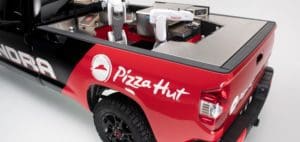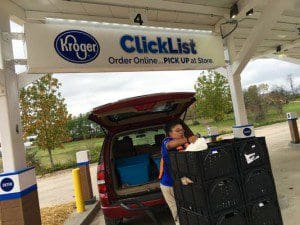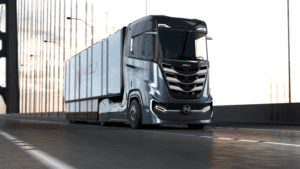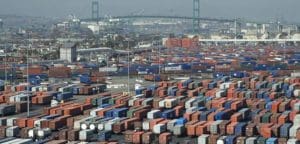 Amazon has finally decided upon its second headquarters. Or has it? According to multiple reports, Amazon will build out two smaller “headquarters” as supplements to the main headquarters in Seattle, WA. The location of the two outposts, Long Island City, NY and Arlington, VA, are not overly surprising, considering the interest from the Washington, DC and New York City areas. However, many critics cite the whole second headquarters search as nothing more than a publicity stunt and a bait and switch. The ongoing process, which has been ongoing for the last year+, certainly has kept Amazon in the headlines, as entire regions hoped that the e-commerce giant would bring tens of thousands of jobs the area. In the end, Amazon representatives are keeping quiet and letting speculation take its course. And now, on to this week’s logistics news.
Amazon has finally decided upon its second headquarters. Or has it? According to multiple reports, Amazon will build out two smaller “headquarters” as supplements to the main headquarters in Seattle, WA. The location of the two outposts, Long Island City, NY and Arlington, VA, are not overly surprising, considering the interest from the Washington, DC and New York City areas. However, many critics cite the whole second headquarters search as nothing more than a publicity stunt and a bait and switch. The ongoing process, which has been ongoing for the last year+, certainly has kept Amazon in the headlines, as entire regions hoped that the e-commerce giant would bring tens of thousands of jobs the area. In the end, Amazon representatives are keeping quiet and letting speculation take its course. And now, on to this week’s logistics news.
- Amazon promises 2-hour delivery for Diwali
- Pizza Hut unveils robotic delivery truck that bakes pizzas
- Starship is using self-driving robots to deliver packages on-demand
- Alibaba chief pledges to import $200bn in goods over 5 years
- FedEx hikes 2019 shipping rates
- Kroger advances plan to partner with Ocado on e-grocery DCs
- Nikola plans electric road tractor for Europe
- Mexican fruit fly spurs quarantine of LA ports
![]() With the festive season of Diwali upon us, Amazon is offering Prime members fast delivery on specific items. The company announced earlier this week that Amazon Prime Now customers can enjoy the 2-hour ultra-fast delivery of sweets this Diwali from Adigas, Nandini and Lal Sweets in Bengaluru, Almond House and Karachi Bakery in Hyderabad, Ghasitaram in Mumbai, and Bikano and Lal Sweets in Delhi. Prime Now has a vast selection of nearly 10,000 goods across a number of categories, including smartphones, consumer electronics, home and kitchen, and grocery items, which can be delivered within 2 hours. Additionally, customers can shop for Cadbury Celebration gift packs and get them delivered in just 2 hours across these four cities.
With the festive season of Diwali upon us, Amazon is offering Prime members fast delivery on specific items. The company announced earlier this week that Amazon Prime Now customers can enjoy the 2-hour ultra-fast delivery of sweets this Diwali from Adigas, Nandini and Lal Sweets in Bengaluru, Almond House and Karachi Bakery in Hyderabad, Ghasitaram in Mumbai, and Bikano and Lal Sweets in Delhi. Prime Now has a vast selection of nearly 10,000 goods across a number of categories, including smartphones, consumer electronics, home and kitchen, and grocery items, which can be delivered within 2 hours. Additionally, customers can shop for Cadbury Celebration gift packs and get them delivered in just 2 hours across these four cities.
 We have seen a number of fast casual pizza chains offering interesting delivery methods lately, including autonomous cars and robots. Pizza Hut is partnering with Toyota on a new initiative: a pie-making truck. Pizza Hut has partnered with Toyota to create the Tundra PIE Pro, a souped-up SR5 pick-up truck equipped with a robot pizza-maker in the truck bed. The truck can cook a pizza in seven minutes while en route to customers’ house. One robot arm grabs a pre-made pizza from a refrigerator and transfers it to a high-speed, ventless TurboChef oven. A second robot arm transfers the cooked pizza to a round cutting board, slices it into six pieces and places it into an open box.
We have seen a number of fast casual pizza chains offering interesting delivery methods lately, including autonomous cars and robots. Pizza Hut is partnering with Toyota on a new initiative: a pie-making truck. Pizza Hut has partnered with Toyota to create the Tundra PIE Pro, a souped-up SR5 pick-up truck equipped with a robot pizza-maker in the truck bed. The truck can cook a pizza in seven minutes while en route to customers’ house. One robot arm grabs a pre-made pizza from a refrigerator and transfers it to a high-speed, ventless TurboChef oven. A second robot arm transfers the cooked pizza to a round cutting board, slices it into six pieces and places it into an open box.
 Speaking of last mile delivery technology, Starship Technologies is using self-driving robots to deliver packages in the UK. The company’s on-demand package delivery system requires customers to download a mobile app, which gives an alternate delivery address to go in the place of their home address. Once the package arrives there, the app will notify the customer and enable them to request a Starship bot to deliver it to them, wherever they are. Through the app, customers can also track where the package is at all times. The program is live in Milton Keyes, UK, with a free first month of the service, and a £7.99 per month fee for an unlimited number of package deliveries. By the end of the year, Starship aims for the service to be available to residents in the San Francisco Bay Area.
Speaking of last mile delivery technology, Starship Technologies is using self-driving robots to deliver packages in the UK. The company’s on-demand package delivery system requires customers to download a mobile app, which gives an alternate delivery address to go in the place of their home address. Once the package arrives there, the app will notify the customer and enable them to request a Starship bot to deliver it to them, wherever they are. Through the app, customers can also track where the package is at all times. The program is live in Milton Keyes, UK, with a free first month of the service, and a £7.99 per month fee for an unlimited number of package deliveries. By the end of the year, Starship aims for the service to be available to residents in the San Francisco Bay Area.
 Even with the trade war, Alibaba Group has insisted it will continue to import goods. The company announced earlier this week that it will list $200 billion worth of imported goods on its e-commerce platforms from 2019 to 2023 as the government vows to boost imports and open markets. According to Daniel Zhang, CEO, “globalization is one of Alibaba’s most-critical long-term growth strategies.” Alibaba will buy $40 billion worth of imported goods a year under the plan, or more than 5% of the value of all goods sold through its marketplaces last year, including domestic products, which totaled $768 billion.
Even with the trade war, Alibaba Group has insisted it will continue to import goods. The company announced earlier this week that it will list $200 billion worth of imported goods on its e-commerce platforms from 2019 to 2023 as the government vows to boost imports and open markets. According to Daniel Zhang, CEO, “globalization is one of Alibaba’s most-critical long-term growth strategies.” Alibaba will buy $40 billion worth of imported goods a year under the plan, or more than 5% of the value of all goods sold through its marketplaces last year, including domestic products, which totaled $768 billion.
 FedEx announced that it will impose “low to mid-range” general rate increases for 2019 on its US domestic shipping services and will also increase its fees on 56 “accessorials,” services that go beyond a traditional line-haul move. The increases will go into effect on January 7, 2019 and include a 4.9 percent increase for FedEx Express and FedEx Ground. Meanwhile, prices for shipments moving via its less-than-truckload unit, FedEx Freight, will climb by 5.9 percent. For shipments moving via FedEx Express, the company’s air and international unit, the increases will apply to domestic US, US import, and US export services. Also, on January 7, fees will rise on 36 accessorial services imposed by FedEx Express and FedEx Ground, and an additional 20 at FedEx Freight.
FedEx announced that it will impose “low to mid-range” general rate increases for 2019 on its US domestic shipping services and will also increase its fees on 56 “accessorials,” services that go beyond a traditional line-haul move. The increases will go into effect on January 7, 2019 and include a 4.9 percent increase for FedEx Express and FedEx Ground. Meanwhile, prices for shipments moving via its less-than-truckload unit, FedEx Freight, will climb by 5.9 percent. For shipments moving via FedEx Express, the company’s air and international unit, the increases will apply to domestic US, US import, and US export services. Also, on January 7, fees will rise on 36 accessorial services imposed by FedEx Express and FedEx Ground, and an additional 20 at FedEx Freight.
 Warehouse automation, especially within the grocery space, has been on the rise. Kroger has firmed up its plans to build 20 highly automated warehouses for handling e-commerce grocery orders in a tie-up with British retailer Ocado. Under the terms of the agreement, Kroger is expected to order the first three customer fulfillment centers (CFC) by the end of 2018 and order a total of 20 CFCs over the first three years. Ocado will spend an estimated $117 million to build the first three facilities, preparing each one to “go live” within two years of its ordering date. In turn, Kroger has increased its ownership stake in Ocado to six percent.
Warehouse automation, especially within the grocery space, has been on the rise. Kroger has firmed up its plans to build 20 highly automated warehouses for handling e-commerce grocery orders in a tie-up with British retailer Ocado. Under the terms of the agreement, Kroger is expected to order the first three customer fulfillment centers (CFC) by the end of 2018 and order a total of 20 CFCs over the first three years. Ocado will spend an estimated $117 million to build the first three facilities, preparing each one to “go live” within two years of its ordering date. In turn, Kroger has increased its ownership stake in Ocado to six percent.
 Nikola Motor Company announced it is developing the Nikola Tre, a fully electric hydrogen-powered day cab tractor aimed at markets in Europe. The root cause for the development in the truck is interest from European customers, but the company insists that future growth will expand to Asia and Australia. According to the company, the Nikola Tre will offer 500 to 1,000 hp, a 6×4 or 6×2 configuration, and a range of 500 to 1,200 kilometers, depending on options. The Tre will fit within current size and length restrictions for Europe.
Nikola Motor Company announced it is developing the Nikola Tre, a fully electric hydrogen-powered day cab tractor aimed at markets in Europe. The root cause for the development in the truck is interest from European customers, but the company insists that future growth will expand to Asia and Australia. According to the company, the Nikola Tre will offer 500 to 1,000 hp, a 6×4 or 6×2 configuration, and a range of 500 to 1,200 kilometers, depending on options. The Tre will fit within current size and length restrictions for Europe.
 And finally, fruit flies are shutting down West Coast ports. Agricultural authorities say a portion of Los Angeles County has been placed under quarantine due to detection of the Mexican fruit fly. The California Department of Food and Agriculture said Tuesday the quarantine includes the ports of Los Angeles and Long Beach. The three flies found so far include two mated females, which indicate a breeding population. The quarantine area spans 79 square miles as the Mexican fruit fly can infest more than 50 types of fruits and vegetables.
And finally, fruit flies are shutting down West Coast ports. Agricultural authorities say a portion of Los Angeles County has been placed under quarantine due to detection of the Mexican fruit fly. The California Department of Food and Agriculture said Tuesday the quarantine includes the ports of Los Angeles and Long Beach. The three flies found so far include two mated females, which indicate a breeding population. The quarantine area spans 79 square miles as the Mexican fruit fly can infest more than 50 types of fruits and vegetables.
That’s all for this week. Enjoy the weekend and the song of the week, Bait and Switch by the Shins.

















Leave a Reply